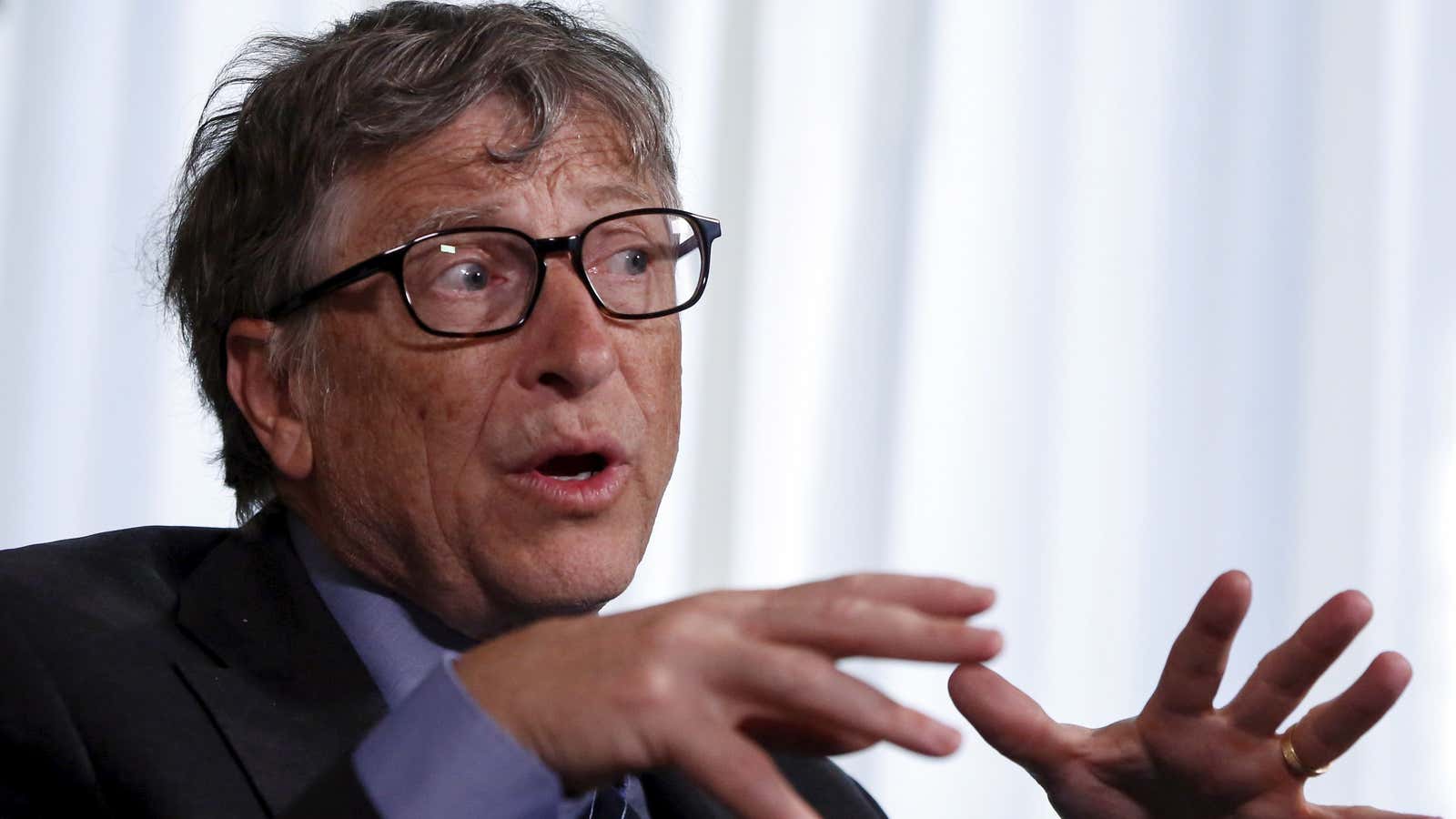Microsoft co-founder Bill Gates appears to have taken a contrarian stance in the battle brewing between Apple and the FBI: In a video interview with the Financial Times (paywall) he speaks supportively of the government agency’s position in the face of widespread opposition from the tech world. But in new remarks today on Bloomberg TV, he seemed to soften his stance, saying that he was “disappointed” and blindsided by headlines saying he backs the FBI.
“I do believe that with the right safeguards, there are cases where the government, on our behalf, like stopping terrorism, that that’s valuable,” he told Bloomberg TV. “But striking that balance … I was hoping now we could have that discussion. I do believe there are sets of safeguards where the government shouldn’t have to be completely blind.”
Apple is resisting a federal court order to help the FBI gain access to an iPhone belonging to a suspect in last December’s shootings in San Bernardino, California. The law enforcement agency wants Apple to create a version of its iOS operating system that would give investigators free reign to guess the passcode without the danger of triggering a security mechanism where the phone erases itself. Apple chief executive Tim Cook has said the request is tantamount to asking for a “backdoor,” likening it to a “master key” that could be used on “hundreds of millions” of devices. There has been debate among security observers about whether the FBI request is properly called a “backdoor” or a less powerful software “bypass.”
In the Financial Times interview, Gates disputed Cook’s description of the FBI request, saying that the security workaround the agency requested couldn’t be labeled a “backdoor” because it wasn’t a request for widespread access to Apple devices. “Nobody’s talking about a backdoor… this is a specific case where the government is asking for access to information. They’re not asking for a general thing, they’re asking for a particular case,” Gates told the FT.
Gates went on to poke holes in Apple’s argument, saying that it had the means to access the data but was refusing to do so. Gates illustrated the argument with this analogy: “Let’s say the bank tied a ribbon around a disk drive and says, ‘Oh, don’t make me cut this ribbon because you’ll make me cut it many times,’ just because this guy’s such a terrible person. Anyway, it’s a simple question of … is there any case where a company should provide the information?”
Gates also refuted Apple’s argument that complying with the FBI request would put it on a slippery slope towards ever greater government surveillance of user data. “Any time a bank is told to turn over bank account information, as soon as they do that on one person, they’re admitting they can do it to many people,” he said.
Gates is breaking ranks with technology figures around the world by speaking supportively of the FBI’s request. Facebook co-founder Mark Zuckerberg was the latest to side with Apple, saying yesterday (Feb. 22) that his firm is “sympathetic” with the iPhone maker. “We believe in encryption; we think it’s an important tool. I just don’t think it’s the right thing to block that from mainstream products that people want to use,” he said at the Mobile World Congress in Barcelona.
Chinese manufacturer Huawei said it also backed Tim Cook’s approach to user privacy, saying that “security protection is key” for its customers. Gates’ own firm, Microsoft, is a member of a trade group called Reform Government Surveillance that issued a statement opposing government-mandated backdoors. Other members of the group are AOL, LinkedIn, Dropbox, Yahoo and others, as well as Apple itself. Microsoft CEO Satya Nadella retweeted a link to the statement posted by Microsoft president Brad Smith.
But Gates argued in the FT video that the latest FBI request is similar to the government requests for data from banks or phone operators. Tech companies regularly comply with US government requests for user data: ”You shouldn’t call the access some special thing. It’s no different than, should anybody ever be able to tell the phone company to get information… There’s no difference between information, the government’s come asking for a specific set of information.”
Ultimately, Gates told Bloomberg, government will determine what level of access is necessary. “Well, the courts are going to decide this,” he said. “I think Apple said whatever the final decision is, they’ll abide by it. In the meantime that gives us this opportunity to have that discussion, and these issues will be decided in Congress.”




